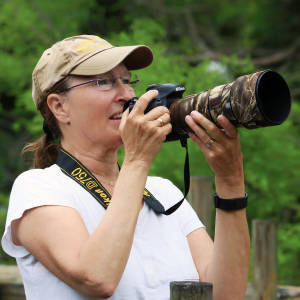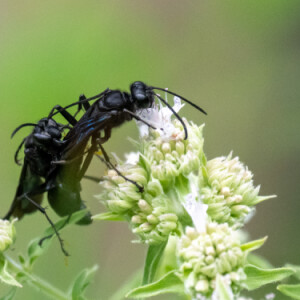Great
Over the last dozen years, I've gained an appreciation for wasps, most especially the solitary wasps (as opposed to wasps who live in communal nests). Solitary wasps are generally quite docile, lacking any instinct to protect a "hive". Over the years, I've photographed big wasps like this Great Black Wasp (Sphex pensylvanicus) from a distant of mere inches and really never had any worry about being stung. I have a small colony of Great Golden Diggers who nest around our patio each year, but this is the first year I've seen more than one or two Great Blacks. I saw at least 5 in the mountain mint this afternoon which means that they are burrowing somewhere around our property.
Great blacks are parasitic wasps and their prey of choice are katydids, crickets and grasshoppers. They catch and sting their prey and carry it back to their nest where they will lay one egg on/in it, allowing the larvae to feed on the insect. Gruesome perhaps, but most solitary wasps are parasitic. Adult wasps only eat nectar and they have a definite preference for mountain mint and swamp milkweed in our garden. I did mange to get a glimpse of two great blacks mating - I'll put a shot in Extra. The action was too fast to catch good photos.
Hubs went on a 26 mile bike ride this morning which I think was just what he needed. And we FaceTimed with my parents which was especially great today.
I've spent most of the day outside, enjoying my garden and my camera. I checked in on the various nest boxes - two broods of house wrens are feathered and close to fledging; another house wren box has 7 eggs; and the bluebird babies will likely fledge tomorrow. This makes seven broods of birds in my nest boxes this summer, which is a lot. And that doesn't count the robins, cardinals, catbirds, finches and blue jays who also nested nearby, in some cases with multiple broods. I love having a nature habitat to tend. It feeds my soul.
Many memories of Virginia today
xo
Debbi


Comments
Sign in or get an account to comment.


